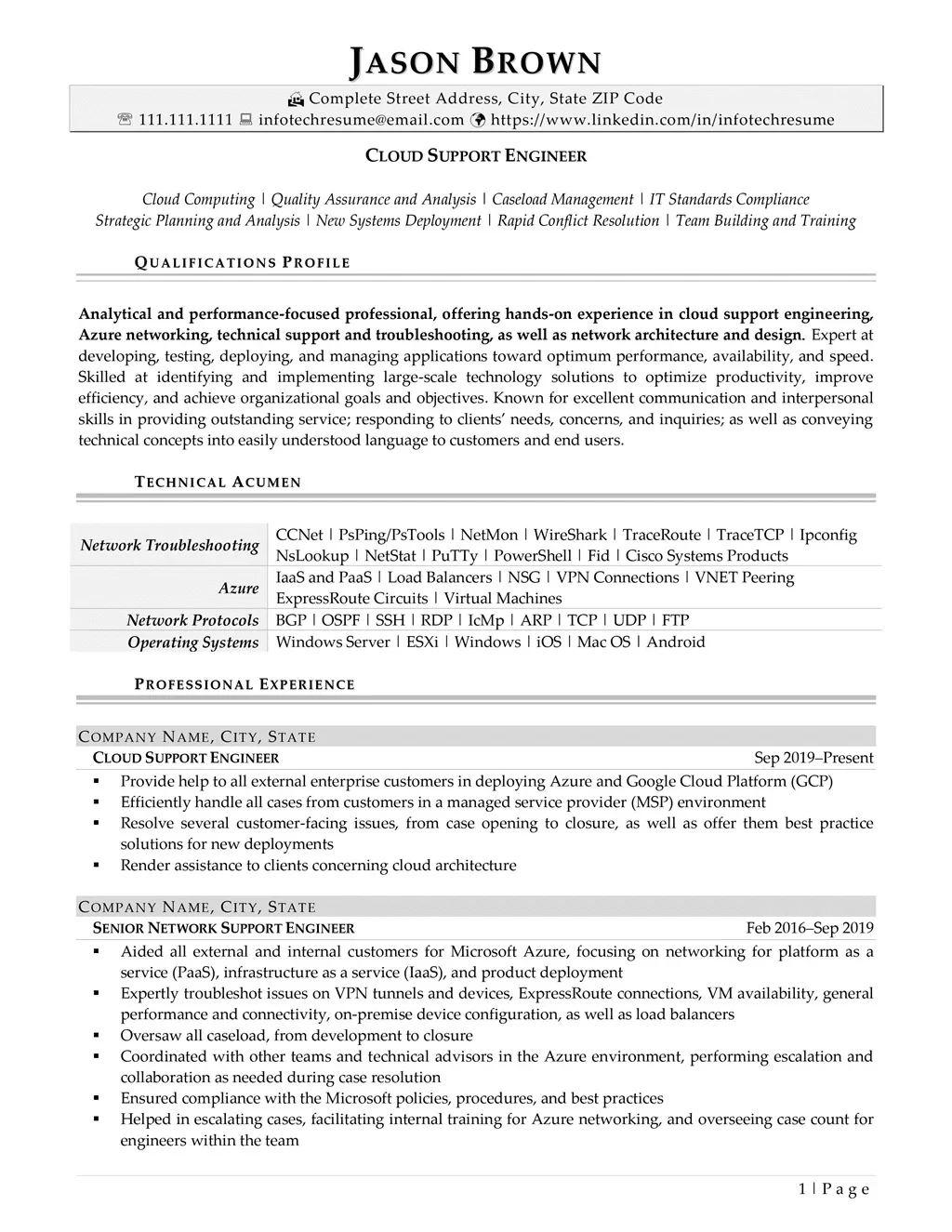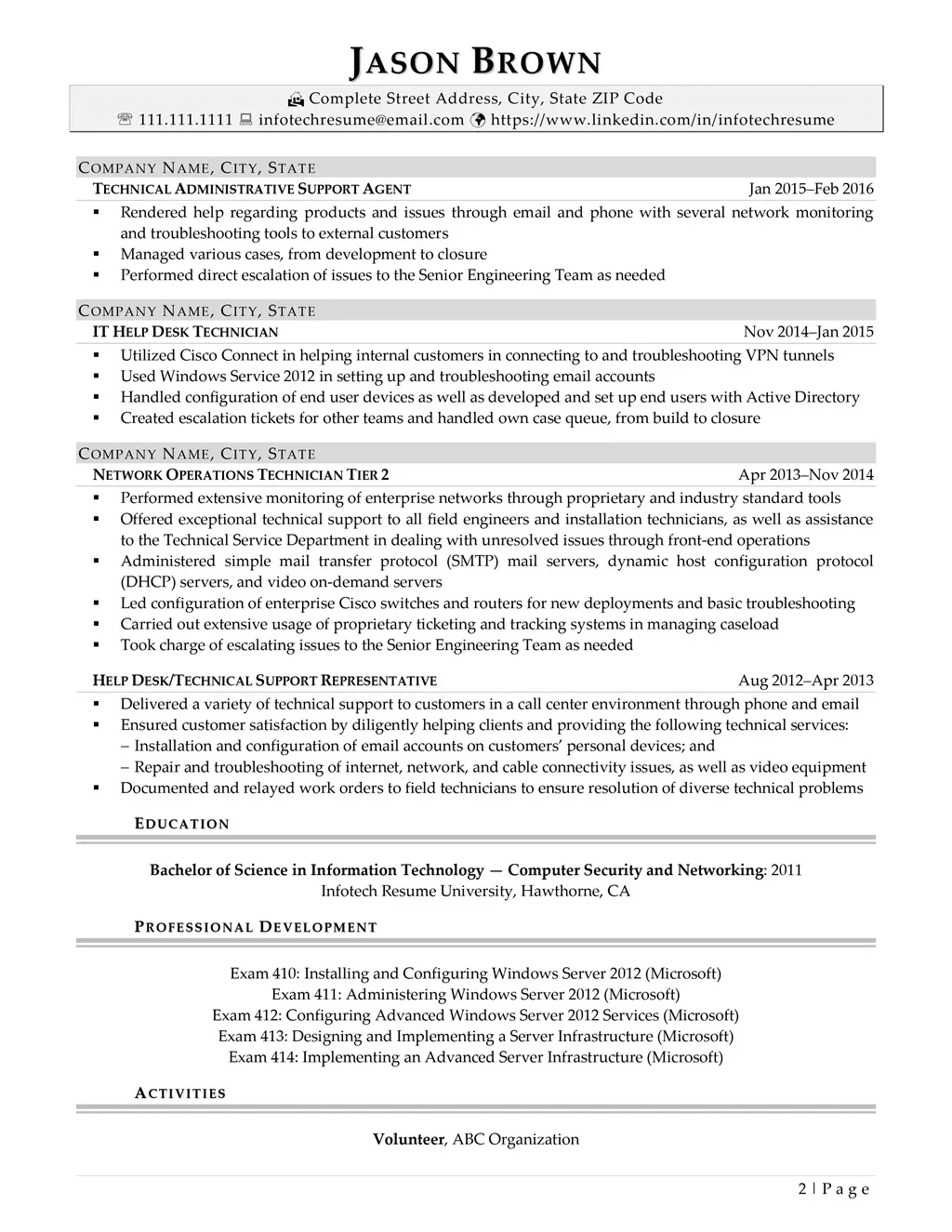As businesses increasingly adopt cloud-based solutions to streamline their operations, cloud support engineers have become more critical than ever. These professionals play a key role in troubleshooting technical issues, managing cloud infrastructure, and ensuring a seamless customer experience. Therefore, in order to excel in this rapidly evolving field, having a standout cloud support engineer resume is a must.
This comprehensive guide will provide key elements that make a cloud support engineer resume effective. We’ll also offer helpful tips to write your own resume, alongside a sample cloud support engineer resume you can use as your jumping-off point. Whether you’re new to the field or looking to advance your career, understanding these resume essentials will position you for success in this growing industry. Let’s go.
What is a Cloud Support Engineer?
A cloud support engineer is an IT professional responsible for providing technical support for cloud-based platforms, which include Amazon Web Services (AWS), Google Cloud, and Microsoft Azure. They work with cross-functional teams to resolve customer issues and ensure that cloud services are running smoothly.
The role demands advanced troubleshooting techniques, systems administration skills, and customer communication during critical events. To excel in this role, cloud support engineers must possess a mix of technical skills and customer-focused communication abilities. Key qualifications include knowledge of cloud technologies, experience in technical support, and the ability to work with cross-functional teams.
Additionally, their responsibilities include the following:
- Resolving technical issues related to cloud platforms.
- Providing customer support during cloud service disruptions.
- Collaborating with internal teams to address complex problems.
- Ensuring security and compliance in cloud environments.

Essential Components of a Cloud Support Engineer Resume
Your resume is your initial impression on hiring managers, so it’s crucial that each section is clear, concise, and professionally presented. This ensures that you make a strong and positive impact from the very beginning.
Contact Information
Your contact details should be easy to find and professional. Include your full name, phone number, email address, and LinkedIn profile URL (if any). Make sure your email address and LinkedIn profile are up-to-date, as these are often the primary means of communication with potential employers.
Professional Summary
A compelling professional summary grabs the recruiter’s attention within seconds. Focus on your key achievements and skills related to cloud support, technical troubleshooting, and customer service. For instance:
Cloud Support Engineer with more than 5 years of experience in resolving complex cloud platform issues, specializing in AWS and Google Cloud. Armed with proven track record in providing advanced troubleshooting and top-tier customer support during critical events. Known as an AWS Certified Solutions Architect, adept at managing cloud environments for cross-functional teams.
Skills Section
Clearly highlight both your technical and soft skills in a well-organized section. This helps recruiters quickly identify your key qualifications and strengths. Key technical skills to include are:
- Cloud Platforms: AWS, Google Cloud, Microsoft Azure.
- Technical Troubleshooting: Advanced troubleshooting techniques for cloud computing systems.
- Customer Support: Resolving customer issues and ensuring service continuity.
- Systems Administration: Managing and optimizing cloud environments.
Having said that, don’t forget your soft skills too, such as communication, problem-solving, and teamwork. These are all crucial when working with customers and internal teams.
Work Experience
Your work experience section should focus on your relevant roles in cloud support and IT. Use bullet points to list your responsibilities and accomplishments, highlighting specific achievements. Here’s an example of how to structure this section:
Cloud Support Engineer | XYZ Tech Solutions | 2018–Present
- Collaborated with cross-functional teams to troubleshoot and optimize cloud infrastructure.
- Implemented advanced troubleshooting techniques to resolve cloud platform outages for enterprise clients.
- Resolved complex technical issues for cloud-based services, leading to a 95% customer satisfaction rate.
- Managed customer communication during critical events, reducing downtime by 30%.
Education and Certifications
Cloud certifications are critical in this field, so make sure to highlight any relevant credentials. Common certifications include AWS Certified Solutions Architect, Google Cloud Certified Professional Cloud Architect, and Microsoft Certified Azure Administrator. Additionally, include your highest level of education, whether it’s a bachelor’s degree in Information Technology or a related field.
Tips for Tailoring Your Cloud Support Engineer Resume
Tailoring your resume for specific job applications is key to standing out from the competition. Start by carefully reading the job description and identifying keywords that are relevant to the role.
Use Industry Keywords
Applicant Tracking Systems (ATS) scan resumes for specific keywords. Ensure you include relevant phrases like “cloud platforms,” “technical support,” and “troubleshooting” throughout your resume.
Customize for Each Job
Highlight different aspects of your skills and experience depending on the specific job requirements. For instance, if a role emphasizes AWS, ensure that your AWS-related experience is prominent.
Convey Your Career’s Upward Trajectory
Employers look for candidates with potential for career advancement. Use your resume to highlight moments where you took on leadership roles or enhanced the efficiency of cloud operations.
Related Article: Basic IT Job Search Tips to Remember

Common Mistakes to Avoid in a Cloud Support Engineer Resume
Avoid vague descriptions and poor formatting, and ensure you include all relevant certifications. Be specific about your accomplishments and use a professional layout to make your resume stand out.
Lack of Specificity
Avoid vague descriptions of your roles and responsibilities. Instead of saying “provided customer support,” try “resolved over 200 technical support tickets related to AWS infrastructure.”
Poor Formatting
Use a clean and professional format that is easy to read. Avoid overly complicated designs or fonts.
Omit Certifications
Cloud certifications are highly valued, so don’t forget to list them. Certifications like AWS Certified Solutions Architect and Google Cloud Professional Architect can give you a considerable advantage.
Inconsistent Information
Ensure that your LinkedIn profile and resume contain consistent information regarding your job history and skills.
Cloud Support Engineer Resume Sample
To help you craft a job-winning resume, review the software engineer resume sample below. This example, created by one of our expert resume writers, offers valuable guidance for developing your own standout job application.


Feel free to download a copy of the cloud support engineer resume example above.
Ready to Perfect Your Cloud Support Engineer Resume?
Advancing your career as a cloud support engineer begins with creating a resume that truly reflects your technical expertise, relevant certifications, and significant achievements. In a competitive job market, a polished resume is essential to stand out from a sea of applicants and capture the attention of recruiters. By emphasizing your skills and accomplishments, you position yourself as a top candidate for your dream job.
To ensure your resume is optimized for success, consider leveraging our professional IT resume writing services. At Infotech Resume, we specialize in highlighting your skills in cloud computing and technical support, making your resume work on your behalf.
Ready to boost your career prospects and make a lasting impression? Contact us today to get started and take the first step toward your next great opportunity!





